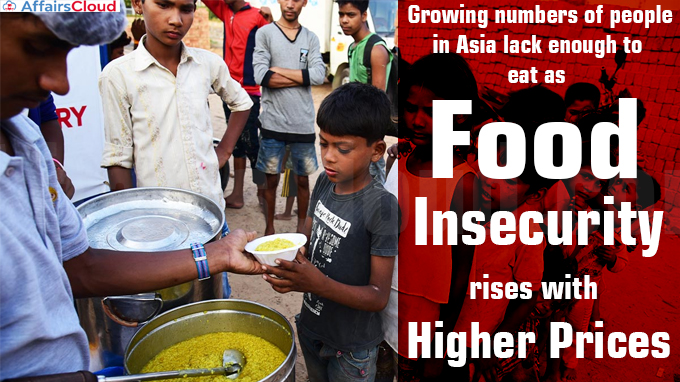 According to a joint report by the United Nations (UN) Agencies titled “Asia-Pacific Overview of Food Security and Nutrition 2022: Urban Food Security and Nutrition”, an increasing number of people in Asia lack enough to eat as food insecurity rises with greater prices and worsening poverty.
According to a joint report by the United Nations (UN) Agencies titled “Asia-Pacific Overview of Food Security and Nutrition 2022: Urban Food Security and Nutrition”, an increasing number of people in Asia lack enough to eat as food insecurity rises with greater prices and worsening poverty.
- This joint flagship report is published by 4 specialized agencies of the UN: The Food and Agriculture Organization (FAO), the United Nations Children’s Fund (UNICEF), the World Food Programme (WFP), and the World Health Organization (WHO).
- The report is the fifth annual assessment of food insecurity and hunger by the UN agencies.
Backdrop
i.The 5F crisis, which refers to a lack of food, feed, fuel, fertilizer, and finance, is driving millions of people in the Asia-Pacific (APAC) region, which is home to the majority of the world’s population, into hunger and poverty.
ii.The Ukraine crisis has inflicted severe damage to several countries that rely on the region for wheat, edible oils, and fertilizer.
iii.The UN’s four specialized agencies have issued a clarion call for urgent coordinated measures to alleviate the effects of the crisis on economies, households, and people in the APAC region, particularly women and children.
Asia-Pacific Overview of Food Security and Nutrition 2022: Key Observations
i.According to the report, about a half billion people were undernourished in 2021, with more than eight in ten of them in South Asia, and more than 1 billion experienced moderate to severe food insecurity.
ii.Globally, the prevalence of food insecurity increased from 21% in 2014 to over 29% in 2021.
iii.According to the report, Asia’s cities are growing at such a rapid pace that about 55% of the region’s vast population is predicted to live in urban areas by 2030, with equally huge implications for urban food security and nutrition.
iv.According to UN agencies, the prevalence of undernourishment was 9.1% in 2021, down from 14.3% in 2000 but up slightly from 2020.
v.Every year, the APAC region imports nearly USD 2 trillion in food.
vi.In Asia, about 2 billion people, or nearly 45% of the population, cannot afford healthy diets, which worsens hunger as well as anaemia and obesity issues.
vii.According to the report, stunting, or having a small height for their age, affects over one-fourth of children in the APAC region.
Click here to find more key messages from the report
Note:
i.The FAO Food Price Index (FFPI), which reached a new high in March 2022, dipped down when commodity prices decreased later in the year, but it is still 28% higher than in 2020.
- FAO is a UN specialized agency that coordinates global efforts to end hunger.
ii.According to World Bank (WB) data, poverty increased by 2.6% between 2015 and 2018.
Other Findings from The Report:
i.Since the Taliban seized control in Afghanistan in August 2021, its economy has collapsed, leaving 70% of the population with moderate to severe food insecurity.
ii.In Cambodia, half of the population suffers from moderate to severe food insecurity.
iii.Anemia, which causes fatigue and, in its most severe forms, can damage the heart and lungs, affects one-third of Asian women between the ages of 15 and 49.
Recent Related News:
i.The Food and Agriculture Organization (FAO) of the United Nations (UN) recently released a report titled “The Future of Food and Agriculture: Drivers and Triggers for Transformation,” which claims that if current agrifood systems don’t change, the world will continue to experience persistent food insecurity, resource degradation, and unsustainable economic growth.
ii.If considerable efforts are not taken to halt current trends, there will be 10 billion people in the world by 2050, creating an unimaginable burden to feed.
About the United Nations World Food Programme (WFP):
The World Food Program (WFP) is the largest humanitarian organisation in the world. It was awarded the Nobel Peace Prize in 2020.
Executive Director – David Beasley
Headquarters – Rome, Italy
Established – 1961




